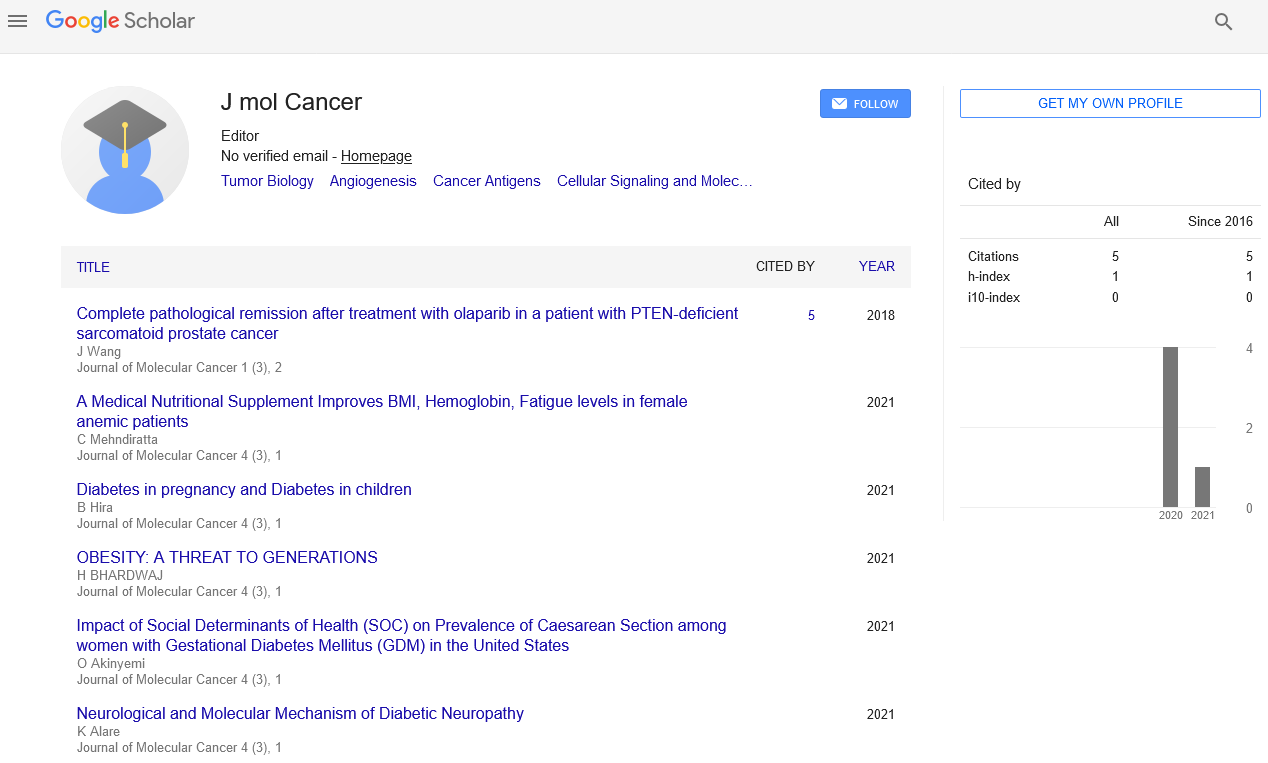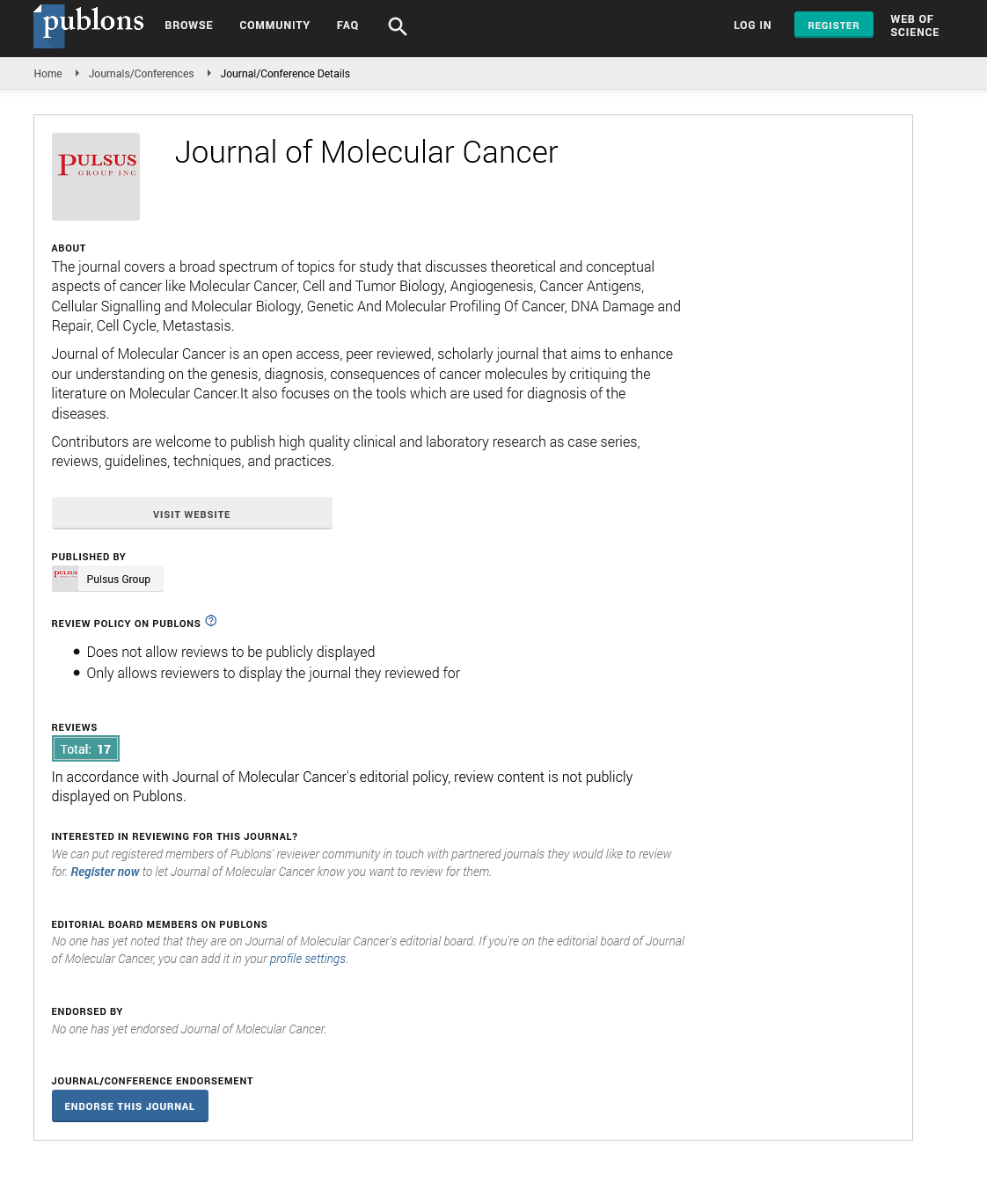Cancer stem cells: Decoding the drivers of tumor initiation, progression and resistance
Received: 19-Dec-2023, Manuscript No. puljmc-24-7163; Editor assigned: 20-Dec-2023, Pre QC No. puljmc-24-7163; Accepted Date: Jan 24, 2024; Reviewed: 09-Jan-2024 QC No. puljmc-24-7163; Revised: 16-Jan-2024, Manuscript No. puljmc-24-7163; Published: 26-Jan-2024
Citation: Matsushita T. Cancer stem cells: Decoding the drivers of tumor initiation, progression and resistance. J Mol Cancer. 2024; 6(1):1-2.
This open-access article is distributed under the terms of the Creative Commons Attribution Non-Commercial License (CC BY-NC) (http://creativecommons.org/licenses/by-nc/4.0/), which permits reuse, distribution and reproduction of the article, provided that the original work is properly cited and the reuse is restricted to noncommercial purposes. For commercial reuse, contact reprints@pulsus.com
Abstract
Cancer Stem Cells (CSCs) are a pivotal discovery in oncology, offering profound insights into tumor biology and resistance mechanisms. Unlike their differentiated counterparts, CSCs have the unique ability to self-renew, initiate tumors, and survive conventional treatments, contributing to tumor heterogeneity, recurrence, and metastasis. This article provides a comprehensive overview of CSCs, exploring their defining characteristics, roles in cancer progression, and the challenges they present in treatment. Additionally, current research efforts aimed at targeting CSCs are discussed, highlighting advancements in therapeutic strategies and future directions for improving patient outcomes.
Key Words
Cancer stem cells; Tumor heterogeneity; Self-Renewal; Drug resistance; Targeted therapy; Tumor recurrence; Oncology
Introduction
Cancer Stem Cells (CSCs) have transformed our understanding of tumor biology by introducing a paradigm shift in how we view cancer growth and treatment resistance. CSCs are a subpopulation of cells within tumors that possess the ability to selfrenew and generate heterogeneous tumor progeny. This model contrasts with the traditional view of tumors as a collection of uniform cancer cells and highlights the complexity of tumor development and maintenance.
The discovery of CSCs has provided new insights into tumor initiation, progression, and metastasis. These cells are thought to be responsible for the persistence of cancer despite treatment and for the eventual recurrence of the disease. Understanding CSCs is crucial for developing more effective therapies and improving patient outcomes. This article delves into the characteristics of CSCs, their role in cancer, and the emerging strategies for targeting them.
CSCs are defined by their ability to self-renew and differentiate into various cell types within the tumor. This capacity is similar to that of normal stem cells, which maintain tissue homeostasis. In the context of cancer, CSCs can perpetuate the tumor by continuously generating new cancer cells while also producing differentiated progeny that make up the bulk of the tumor. CSCs are believed to be the root cause of tumor initiation and maintenance. They can initiate tumor formation when transplanted into immunocompromised mice, demonstrating their role in the origin of tumors. Moreover, CSCs contribute to the maintenance of tumor heterogeneity, which complicates treatment and contributes to the tumor's ability to resist therapy.
CSCs are notoriously resistant to conventional cancer treatments such as chemotherapy and radiation. This resistance is partly due to their ability to enter a quiescent state, making them less susceptible to therapies that target actively dividing cells. Additionally, CSCs often have enhanced DNA repair mechanisms, drug efflux pumps, and protective microenvironmental factors that shield them from the effects of treatment.
CSCs are typically identified by specific cell surface markers that vary depending on the tumor type. Common markers include CD44, CD24, ALDH1, and others. These markers are used to isolate and study CSCs, although their expression can vary, complicating the identification and targeting of these cells.Tumor heterogeneity refers to the diverse nature of cells within a tumor. CSCs contribute to this heterogeneity by giving rise to various cell types, including both CSCs and differentiated cells. This diversity is a significant challenge in cancer treatment, as different cell types may respond differently to therapies.
CSCs are involved in the process of metastasis, where cancer cells spread from the primary tumor to distant sites. They have enhanced migratory and invasive capabilities, which enable them to disseminate and form secondary tumors. CSCs are also better equipped to survive in the hostile conditions of metastatic sites.One of the major challenges in cancer treatment is tumor recurrence, which often occurs after initial therapy. CSCs are believed to be the primary contributors to recurrence due to their ability to survive treatment and regenerate tumors. They can remain dormant for extended periods and reactivate to drive relapse once treatment is withdrawn or becomes less effective.
Accurately identifying and isolating CSCs remains a challenge due to their heterogeneity and variability in marker expression. While specific markers are used, they are not universally reliable across all tumor types, and CSCs may not always express these markers consistently.
CSCs possess multiple mechanisms that contribute to their resistance to therapies. These include enhanced DNA repair capabilities, the presence of drug efflux pumps, and the ability to enter a quiescent state. Overcoming these mechanisms requires innovative therapeutic strategies that specifically target CSCs.The tumor microenvironment, including factors such as hypoxia, inflammatory cytokines, and extracellular matrix components, plays a crucial role in CSC behavior and therapy resistance. The interactions between CSCs and their microenvironment can affect their response to treatment and contribute to their survival.
Researchers are developing targeted therapies aimed specifically at CSCs. These include inhibitors of key signaling pathways involved in CSC maintenance, such as the Wnt, Notch, and Hedgehog pathways. Other strategies involve targeting CSC-specific surface markers with monoclonal antibodies or engineered T cells, such as CAR-T cell therapies, to directly attack CSCs.Combining conventional therapies with CSC-targeted treatments is a promising approach to overcome resistance and improve treatment outcomes. For example, combining chemotherapy with agents that specifically target CSCs may enhance the overall efficacy of treatment and reduce the likelihood of recurrence.
Advances in genomics and proteomics are enabling more precise profiling of CSCs, which can inform personalized treatment approaches. By tailoring therapies based on the specific molecular characteristics of a patient’s CSCs, clinicians can develop more effective and targeted treatment plans.Continued research into the biology of CSCs is essential for developing new therapeutic strategies. This includes studying the molecular pathways that regulate CSC selfrenewal and differentiation, as well as understanding how CSCs interact with their microenvironment.
Conclusion
Cancer stem cells represent a crucial component of tumor biology, playing a key role in tumor initiation, progression, and resistance to conventional therapies. Their ability to self-renew, contribute to tumor heterogeneity, and evade treatment poses significant challenges in cancer management. However, the ongoing research into CSCs is providing valuable insights that could lead to more effective treatments and improved patient outcomes.
Targeting CSCs with novel therapies and combining these approaches with existing treatments offer promising strategies for overcoming the limitations of current cancer therapies. As our understanding of CSC biology deepens, the development of targeted and personalized treatments will be essential for advancing cancer care and achieving long-term remission and cure. The future of cancer treatment will increasingly rely on addressing the unique characteristics of CSCs to enhance therapeutic efficacy and improve survival rates.






